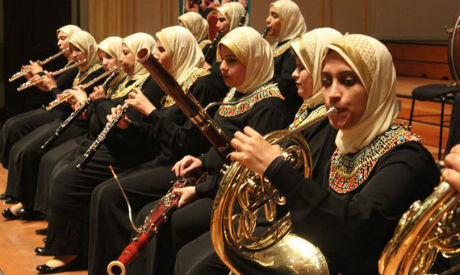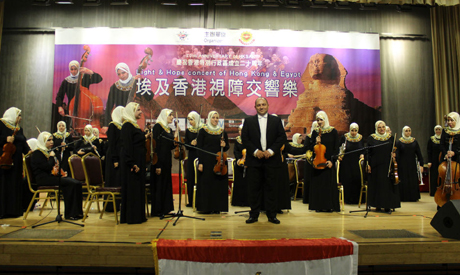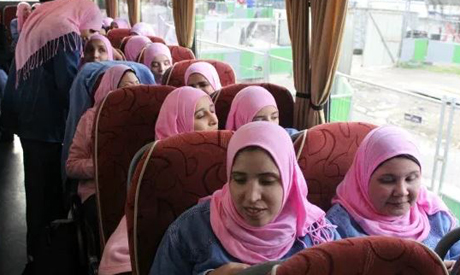After long period in limbo due to the Covid-19 pandemic and the general shutdown of cultural activities and numerous institutions, Al Nour Wal Amal Chamber Orchestra is returning to activities resuming rehearsals in preparation for a return concert.
For this unique ensemble consisting of blind woman musicians there is a lot of catching up to do as they were deprived of practicing for almost five months.
Operating under the Al-Nour Wal Amal Association, over the past decades the orchestra has been a shining light of Egypt’s musical firmament. With hundreds of concerts inside Egypt and dozens of tours across the globe, the orchestra wins the hearts of listeners while the international media describes them as “the fourth pyramid of Giza” and “a human miracle.”
After the reopening of Al-Nour Wal Amal Association’s doors, the musicians are preparing for their first concert scheduled to take place at the Manasterly Palace on 20 September.
The task might seem difficult at first, as months without practice took its toll on musical delivery. However, led by maestro Mohamed Saad Basha, trained by a team of the professional musicians, and pushed by their boundless passion for music and performing, the orchestra has enough time to get ready for the concert.
“The girls do not have the instruments at home. They practice and make rehearsals inside the association using the instruments that belong to Al-Nour Wal Amal Association. It follows that when the pandemic closed the association’s doors, they could not practice. But it's a matter of time and work and they will get back into shape,” commented Amal Fikry, the association’s vice president and head of the orchestra.

Wind section of Al Nour Wal Amal Orchestra (Photo: Ati Metwaly)
Fikry explained that in regular circumstances, the orchestra holds rehearsals twice a week throughout the year. In addition, the girls are welcomed to practice whenever it is necessary for them.
Putting precautionary measures in place, since 9 August, the 50-member strong orchestra has been divided into two groups, each rehearsing once a week. Meanwhile, the Junior Orchestra, which consists of 37 young girls, has also returned to practice, also divided into smaller groups.
Fikry shared her happiness to be back and to see the girls in the association, practicing, and chitchatting across its rooms and corridors.
Concerts are an important part of the orchestra’s life. Through practice and performance, the musicians gain a sense of accomplishment. On the other hand, music activities provide them with income, especially needed for women musicians responsible for households and with children.
“The musicians receive a nominal salary every month, but the amount represents a third of their needs. They gain the remaining amount through concerts, whether inside or outside Egypt,” Fikry explained, pointing to the financial burdens that the general lockdown placed on musicians.

Maestro Mohamed Saad Basha and Al Nour Wal Amal Chamber Orchestra, Hong Kong
(Photo: Ati Metwaly)
“The concerts stopped at the beginning of March. Right before the shutdown, the orchestra had been invited to give two international performances, in Saudi Arabia and in Beijing, China, in March this year. This would have been their first visit to Saudi Arabia and second to China. However, as we all understand, both trips were cancelled,” Fikry commented.
Looking back at the ensemble’s history, Fikry reminds us that throughout past four decades the orchestra played to audiences on five continents and created three generations of musicians, with the Junior Orchestra being established in recent years.
Al-Nour Wal Amal’s first performance in China and Hong Kong took place in July 2017, while other appearances in Asia included Japan, Thailand and India.
Many countries on other continents have also welcomed and warmly applauded Egypt’s “human miracle.”
Al-Nour Wal Amal Association is an NGO for Egyptian blind girls founded in 1954 by a group of volunteers led by the late Istiklal Radi, with the aim of educating visually impaired girls and helping them integrate into society.
In 1961, seven years after the establishment of the association, Al-Nour Wal Amal Music Institute was founded by the late Samha El-Kholy, former dean of the Cairo Conservatory. The girls started being trained by musicians from the Cairo Conservatory and the Cairo Symphony Orchestra. The girls study all aspects of music: theory, harmony, solfege, ear-training and learn to read music in Braille.
Their repertoire consists of many well-known Western classical music compositions, topped with a few works from the Arab/Oriental repertoire. Often they also add a work of the country they are visiting to their performance. Throughout the years, the orchestra was led by maestri Ahmed Abul Eid followed by Ali Osman. The current conductor of the orchestra is Mohamed Saad Basha.
With the dawn of the 1970s, the few musicians strong orchestra started performing across a variety of venues in Cairo and made its first appearance at the stage of the Old (Khedivial) Opera House in early 1971. International tours kicked off in 1988, when the orchestra performed in the famous Town Hall of Vienna.

On the road. Al Nour Wal Amal in a bus in Paris. November 2015. (Photo: Ati Metwaly)
For more arts and culture news and updates, follow Ahram Online Arts and Culture on Twitter at @AhramOnlineArts and on Facebook at Ahram Online: Arts & Culture
Short link: